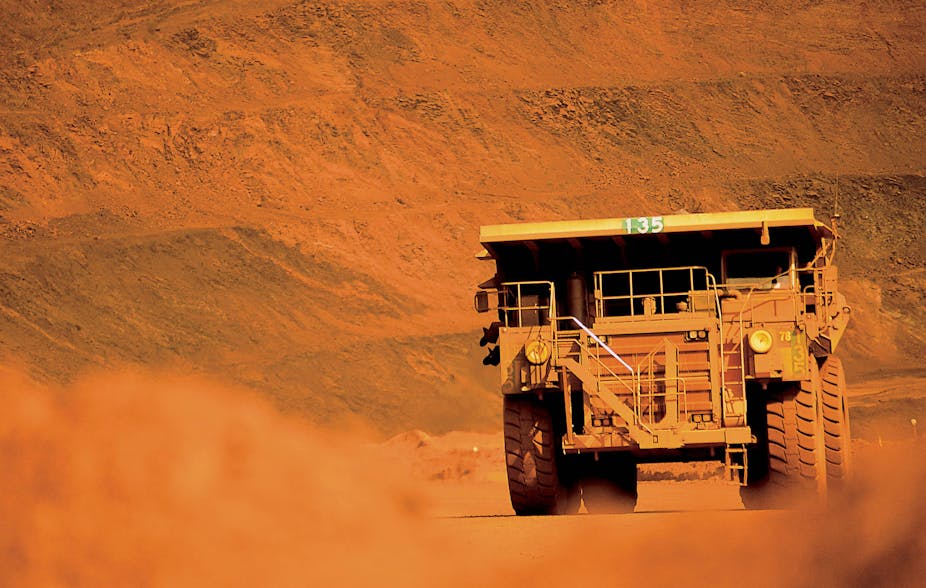The Commonwealth and state governments share a portion of the revenue windfalls of a mining boom through income taxation and royalties.
However, both the current arrangements, and proposed changes by the Commonwealth, unnecessarily distort decisions and arguably they are inequitable.
Mining requires labour, management and capital resources along with access to natural resources.
Commonwealth income tax, state payroll tax and other taxes share revenue from incomes and expenditures earned on labour, management and capital used in mining, much as they do for these resources if they were employed in other industries.
The key to sharing
The key debate about the share of the mining boom is government taxation of the economic rent earned on the natural resources.
Natural resources are owned by state governments. Different mines differ in terms of characteristics which affect per unit mining costs.
Well endowed mines with low costs have a combination of large reserves of high quality material close to the surface which is easy to access and transport.
Less well endowed mines have relatively higher per unit costs. The well endowed mines earn a much higher economic rent than the less well endowed mines.
Economic rent is the difference between revenue and the per unit production costs required to pay the labour, capital and expertise reallocated from other industries to mining.
Royalties
State governments collect royalties on on-shore natural resources. Most royalties are an ad valorem charge or percentage of the mineral or energy gross price.
Royalties can be as low as zero for gold in Victoria, through to 5 to 7% for coal in NSW, 6 to 10% for coal in Queensland, and 5 to 7% for iron in WA.
In 2006-07 state royalties collected $3.6 billion. For well endowed and low cost mines, and during mining booms, the royalty as a share of the economic rent is very much lower than for less well endowed mines and in times of mining slumps.
The Commonwealth charges a petroleum resource rent tax (PRRT) on off-shore oil and gas projects.
The PRRT is levied at a rate of 40% on a measure of resource rent.
Here resource rent is a measure of revenue less expenditure on labour, management and capital equipment; but in times of negative cash flow losses are carried forward (at the long term bond rate plus 15% in the case of exploration and plus 5% in the case of mine development), and at no stage does government write a cheque to the miner.
In 2006-07 the PRRT collected $3.5 billion.
Income tax is paid on economic rent earned by mines to the commonwealth. Royalties and the PRRT are a deductible expense in measuring taxable income.
In the first instance the 30% corporate income tax rate is paid.
In 2007-08, mining companies paid over $8 billion in corporate income tax, or 14% of total corporate tax.
Australian shareholders are subject to income tax on dividends, but with a credit for corporate income tax paid, and to a capital gains tax at a half rate on share sales.
Distorting, inequitable
State royalties are criticised for reasons of inefficiency and inequity, both absolutely and relative to an alternative economic rent tax. Royalties effectively are a tax on production.
Some not well endowed new mines which could pay the opportunity cost of labour, management and capital inputs are made unprofitable and do not go ahead; and the lives of some existing mines will be shortened by the production tax.
The Henry Review reported that royalties are the most distorting and inefficient of all taxes.
Royalties can be argued to be inequitable. Well endowed mines with low production costs pay the same rate per unit of revenue as a less well endowed mine with much higher production costs.
By contrast, a tax on economic rent, such as the PRRT, would cause less distortions and be seen as more equitable.
Well endowed mines would pay more tax, less well endowed mines less tax, and the marginal but worthwhile mines to the nation would pay only income tax.
In 2010 the commonwealth proposed extending the PRRT to on-shore as well as off-shore oil and gas and the introduction of a mineral resource rent tax (MRRT) at an effective rate of 22.5 per cent on coal and iron ore.
They are to be on top of the current state royalties, rather than a replacement as proposed by the Henry Review and logic. That is, the distortions and inequitable features of royalties will remain.
Difficult reform
Comprehensive reform of special taxation of the mining industry is required, but it will be difficult.
Replacement of the royalties with a tax on economic rents requires renegotiation of Commonwealth-state financial relations.
There are challenges to the measurement of economic rent, and concerns with transition arrangements for existing mines.

